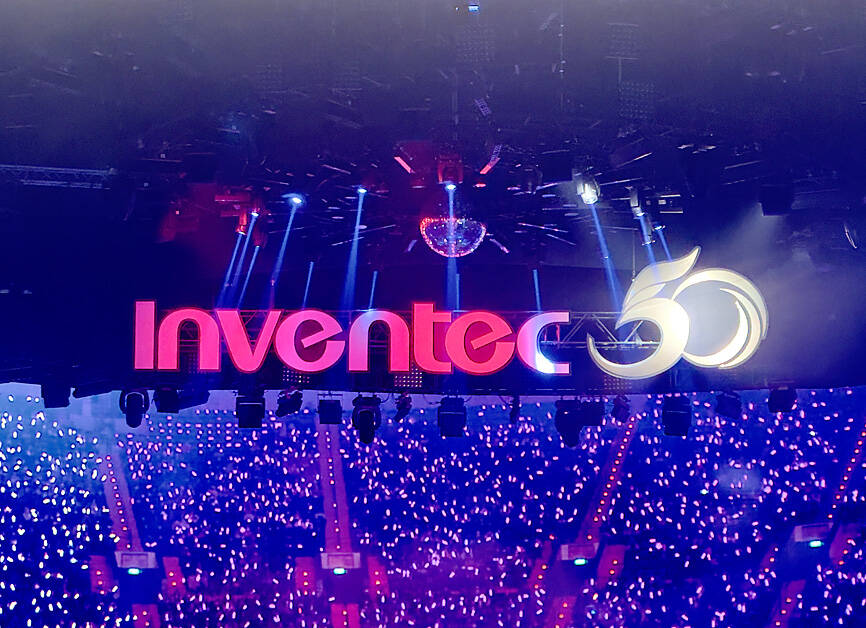Contract electronics manufacturer Inventec Corp (英業達) on Tuesday posted its best profit in 13 quarters as its revenue surged and operating margin held steady.
The company, which produces notebook computers, servers and smart devices for brand clients, reported net profit of NT$2.37 billion (US$71.9 million) in the fourth quarter of last year, up 18.68 percent from the previous quarter.
Profit was up 19.28 percent year-on-year, Inventec said in a regulatory filing.

Photo: Fang Wei-chieh, Taipei Times
Revenue in the quarter increased 21 percent quarterly and 54 percent annually to NT$197.78 billion, and gross margin declined to 5.1 percent, but operating margin improved to 2 percent, company data showed.
Earnings per share (EPS) were NT$0.66 last quarter, the highest since the third quarter of 2021, when the company made NT$0.78 per share.
For this quarter, Inventec expects shipments of notebook computers, servers and wearable devices to be lower than last quarter due to weak seasonal demand.
However, judging from order visibility, the company expects the sequential decline to be less than expected and is positive about increasing shipments in the following quarters, although the global consequences of new US trade policies warrant further observation, it said.
For the whole of last year, Inventec reported net profit of NT$7.27 billion, up 18.53 percent from 2023.
EPS stood at NT$2.03, up from NT$1.71 the previous year.
Full-year revenue increased 26 percent to a record of NT$646.26 billion, gross margin rose 0.1 percentage points to 5.2 percent, the highest in seven years, and operating margin grew 0.4 percentage points to 1.8 percent, the company said.
Inventec’s board of directors on Tuesday proposed distributing a cash dividend of NT$1.7 per share, the company said in a separate regulatory filing.
If approved by shareholders on May 28, the planned cash dividend would represent a payout ratio of 83.74 percent.
Inventec said the board also proposed investing US$539.5 billion in Thailand to renovate plants, and install new equipment on server and laptop production lines.
The company has continued to improve its non-China production capacity in the past few years, aiming to ship goods and components to the US from its manufacturing bases in Thailand, Vietnam, Malaysia, Thailand and Mexico.
Inventec has set up manufacturing bases for automotive electronics in Vietnam and Mexico, production facilities for wearable devices in Malaysia and Vietnam, notebook computer assembly lines in Thailand and Vietnam, and server plants in Taiwan, Mexico and Thailand.
In the wake of new trade policies unveiled by US President Donald Trump, the company was looking for sites in Texas to produce high-end servers, Inventec management said at a corporate event in January, citing the state’s adequate power supply and its proximity to Mexico.

NEW IDENTITY: Known for its software, India has expanded into hardware, with its semiconductor industry growing from US$38bn in 2023 to US$45bn to US$50bn India on Saturday inaugurated its first semiconductor assembly and test facility, a milestone in the government’s push to reduce dependence on foreign chipmakers and stake a claim in a sector dominated by China. Indian Prime Minister Narendra Modi opened US firm Micron Technology Inc’s semiconductor assembly, test and packaging unit in his home state of Gujarat, hailing the “dawn of a new era” for India’s technology ambitions. “When young Indians look back in the future, they will see this decade as the turning point in our tech future,” Modi told the event, which was broadcast on his YouTube channel. The plant would convert

‘SEISMIC SHIFT’: The researcher forecast there would be about 1.1 billion mobile shipments this year, down from 1.26 billion the prior year and erasing years of gains The global smartphone market is expected to contract 12.9 percent this year due to the unprecedented memorychip shortage, marking “a crisis like no other,” researcher International Data Corp (IDC) said. The new forecast, a dramatic revision down from earlier estimates, gives the latest accounting of the ongoing memory crunch that is affecting every corner of the electronics industry. The demand for advanced memory to power artificial intelligence (AI) tasks has drained global supply until well into next year and jeopardizes the business model of many smartphone makers. IDC forecast about 1.1 billion mobile shipments this year, down from 1.26 billion the prior

People stand in a Pokemon store in Tokyo on Thursday. One of the world highest-grossing franchises is celebrated its 30th anniversary yesterday.

Zimbabwe’s ban on raw lithium exports is forcing Chinese miners to rethink their strategy, speeding up plans to process the metal locally instead of shipping it to China’s vast rechargeable battery industry. The country is Africa’s largest lithium producer and has one of the world’s largest reserves, according to the US Geological Survey (USGS). Zimbabwe already banned the export of lithium ore in 2022 and last year announced it would halt exports of lithium concentrates from January next year. However, on Wednesday it imposed the ban with immediate effect, leaving unclear what the lithium mining sector would do in the